Aptos
使用 Aptos Move 实现随机数生成:从 AIP-41 到实战操作
- 寻月隐君
- 发布于 2024-09-16 20:05
- 阅读 3296
使用AptosMove实现随机数生成:从AIP-41到实战操作随机数在区块链上的应用场景十分广泛,如在NFT铸造、游戏逻辑、智能合约安全等方面,都依赖于高质量的随机数生成。然而,传统的随机数生成方式在链上存在一定的安全隐患,尤其是对于恶意操控的风险。AptosMove提供了一种公
使用 Aptos Move 实现随机数生成:从 AIP-41 到实战操作
随机数在区块链上的应用场景十分广泛,如在 NFT 铸造、游戏逻辑、智能合约安全等方面,都依赖于高质量的随机数生成。然而,传统的随机数生成方式在链上存在一定的安全隐患,尤其是对于恶意操控的风险。Aptos Move 提供了一种公开、可信的随机数生成机制。通过最新的 AIP-41 提案,开发者可以在 Aptos 网络上便捷地生成随机数,并将其应用于各种智能合约逻辑中。
本文将深入介绍如何使用 Aptos Move 的随机数生成 API,详细讲解 AIP-41 的背景和功能,并通过一个完整的实战项目演示如何创建和使用随机数生成逻辑。我们将展示如何从初始化项目到生成、存储并查询随机数的完整流程。
Aptos Move 引入了 AIP-41 提案,该提案提供了一套新的 API 来支持链上的随机数生成功能,特别适用于需要公正性和不可预测性的应用场景。本文通过实操项目展示如何在 Aptos Move 中使用这些随机数生成 API。项目从创建、发布到调用合约的每一步操作都有详细讲解,同时,我们也会介绍如何在区块链浏览器中查看生成的随机数及其事件。
通过本文,读者将学会:
• Aptos Move 的随机数生成 API 功能。
• 使用 Aptos Move 构建一个包含随机数生成逻辑的智能合约。
• 通过实际操作掌握合约发布、调用和事件查看等步骤。
更多参考:
https://aptos.dev/en/build/smart-contracts/randomness
AIP-41 - Move APIs for public randomness generation
https://github.com/aptos-foundation/AIPs/blob/main/aips/aip-41.md
实操
创建项目并初始化
hello_aptos on main via 🅒 base
➜
mcd test_random
hello_aptos/test_random on main via 🅒 base
➜
aptos init
Configuring for profile default
Choose network from [devnet, testnet, mainnet, local, custom | defaults to devnet]
No network given, using devnet...
Enter your private key as a hex literal (0x...) [Current: None | No input: Generate new key (or keep one if present)]
No key given, generating key...
Account 0x208d246526904ace865e57314152211523ae2d111a120a5a4c7294310ba1792e doesn't exist, creating it and funding it with 100000000 Octas
Account 0x208d246526904ace865e57314152211523ae2d111a120a5a4c7294310ba1792e funded successfully
---
Aptos CLI is now set up for account 0x208d246526904ace865e57314152211523ae2d111a120a5a4c7294310ba1792e as profile default!
See the account here: https://explorer.aptoslabs.com/account/0x208d246526904ace865e57314152211523ae2d111a120a5a4c7294310ba1792e?network=devnet
Run `aptos --help` for more information about commands
{
"Result": "Success"
}
hello_aptos/test_random on main via 🅒 base took 8.5s
➜
aptos move init --name test_random
{
"Result": "Success"
}
hello_aptos/test_random on main [?] via 🅒 base took 2.0s
➜
open -a RustRover .项目目录结构
hello_aptos/test_random on main [?] via 🅒 base took 7.5s
➜ tree . -L 6 -I 'build'
.
├── Move.toml
├── scripts
├── sources
│ └── random.move
└── tests
4 directories, 2 files
实现代码
random.move
module tester::random {
use std::signer;
use aptos_std::table::{Self, Table};
use aptos_framework::event;
use aptos_framework::randomness;
const E_RANDOM_DATA_NOT_INITIALIZED: u64 = 1;
const E_MESSAGE_NOT_FOUND: u64 = 2; // random_data not found
#[event]
struct Event<T> has drop, store {
value: T
}
struct Random_data has key {
message: Table<address, u64>
}
#[randomness]
entry fun random_u8() {
event::emit(Event {
value: randomness::u8_integer()
})
}
public entry fun init_random_data(account: &signer) {
if (!exists<Random_data>(signer::address_of(account))) {
move_to(account, Random_data {
message: table::new()
})
}
}
#[randomness]
entry fun set_random_u64(account: &signer, n: u64) acquires Random_data{
let addr = signer::address_of(account);
if (!exists<Random_data>(addr)) {
init_random_data(account);
};
let r = randomness::u64_range(0, n);
let random_info = borrow_global_mut<Random_data>(addr);
if (table::contains(&random_info.message, addr)) {
*table::borrow_mut(&mut random_info.message, addr) = r;
} else {
table::add(&mut random_info.message, addr, r);
};
event::emit(Event {
value: r
})
}
#[view]
public fun get_random_data(addr: address): u64 acquires Random_data {
assert!(exists<Random_data>(addr), E_RANDOM_DATA_NOT_INITIALIZED);
let random_data_info = borrow_global<Random_data>(addr);
assert!(table::contains(&random_data_info.message, addr), E_MESSAGE_NOT_FOUND);
*table::borrow(&random_data_info.message, addr)
}
}Publish 发布
/opt/homebrew/bin/aptos move publish
Compiling, may take a little while to download git dependencies...
UPDATING GIT DEPENDENCY https://github.com/aptos-labs/aptos-core.git
INCLUDING DEPENDENCY AptosFramework
INCLUDING DEPENDENCY AptosStdlib
INCLUDING DEPENDENCY MoveStdlib
BUILDING test_random
package size 2087 bytes
Do you want to submit a transaction for a range of [174000 - 261000] Octas at a gas unit price of 100 Octas? [yes/no] >
yes
Transaction submitted: https://explorer.aptoslabs.com/txn/0x1348f630a43693535474ec405f5645102347adb0a6ee912047aada1a855216ae?network=devnet
{
"Result": {
"transaction_hash": "0x1348f630a43693535474ec405f5645102347adb0a6ee912047aada1a855216ae",
"gas_used": 1740,
"gas_unit_price": 100,
"sender": "0f0b05ecb92899c4b459e6a722f5c5a5d16b8fdec3a3fa8337f915ec39dfefa0",
"sequence_number": 0,
"success": true,
"timestamp_us": 1726473412348959,
"version": 67431983,
"vm_status": "Executed successfully"
}
}
Process finished with exit code 0
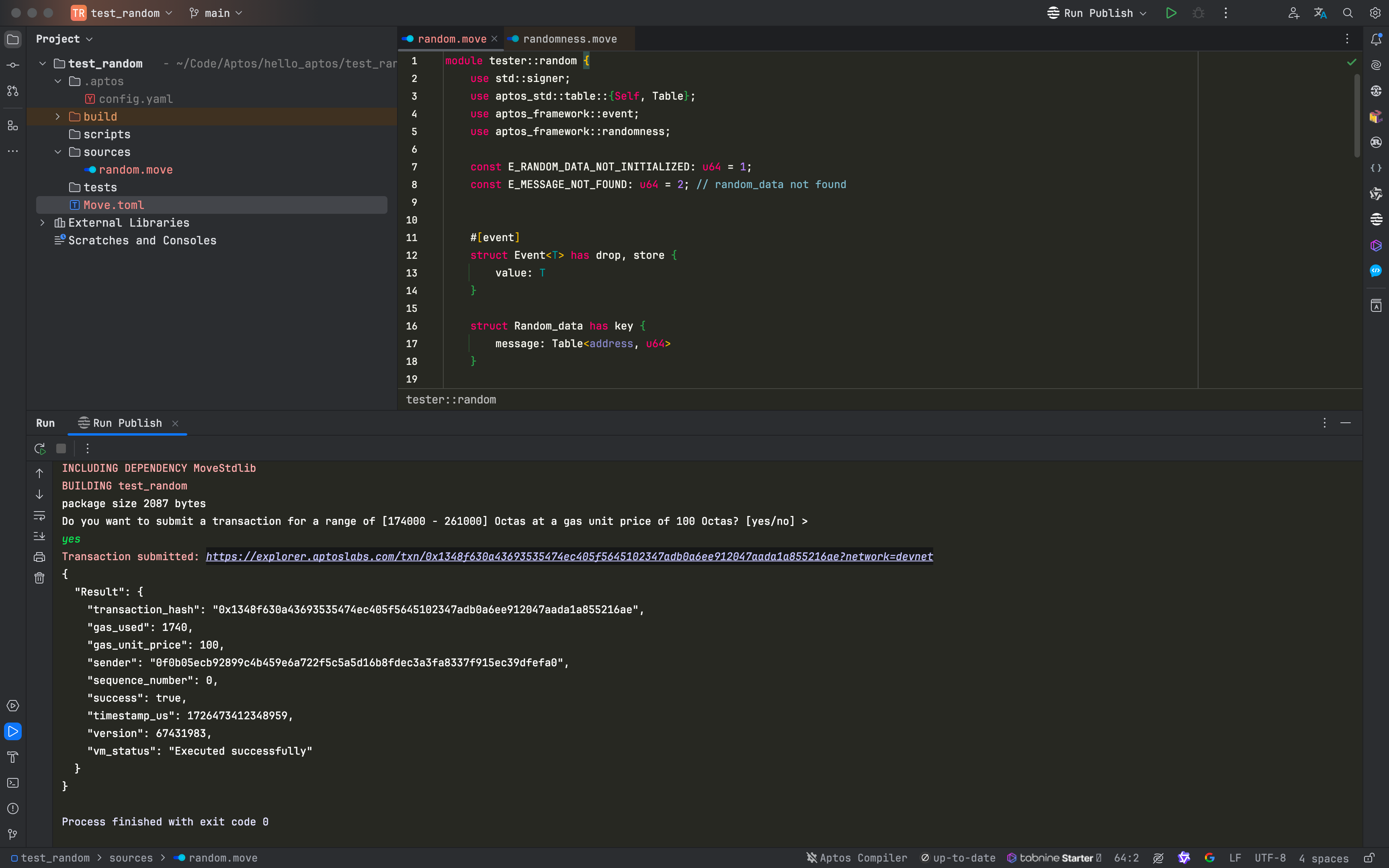
查看 Publish Transaction
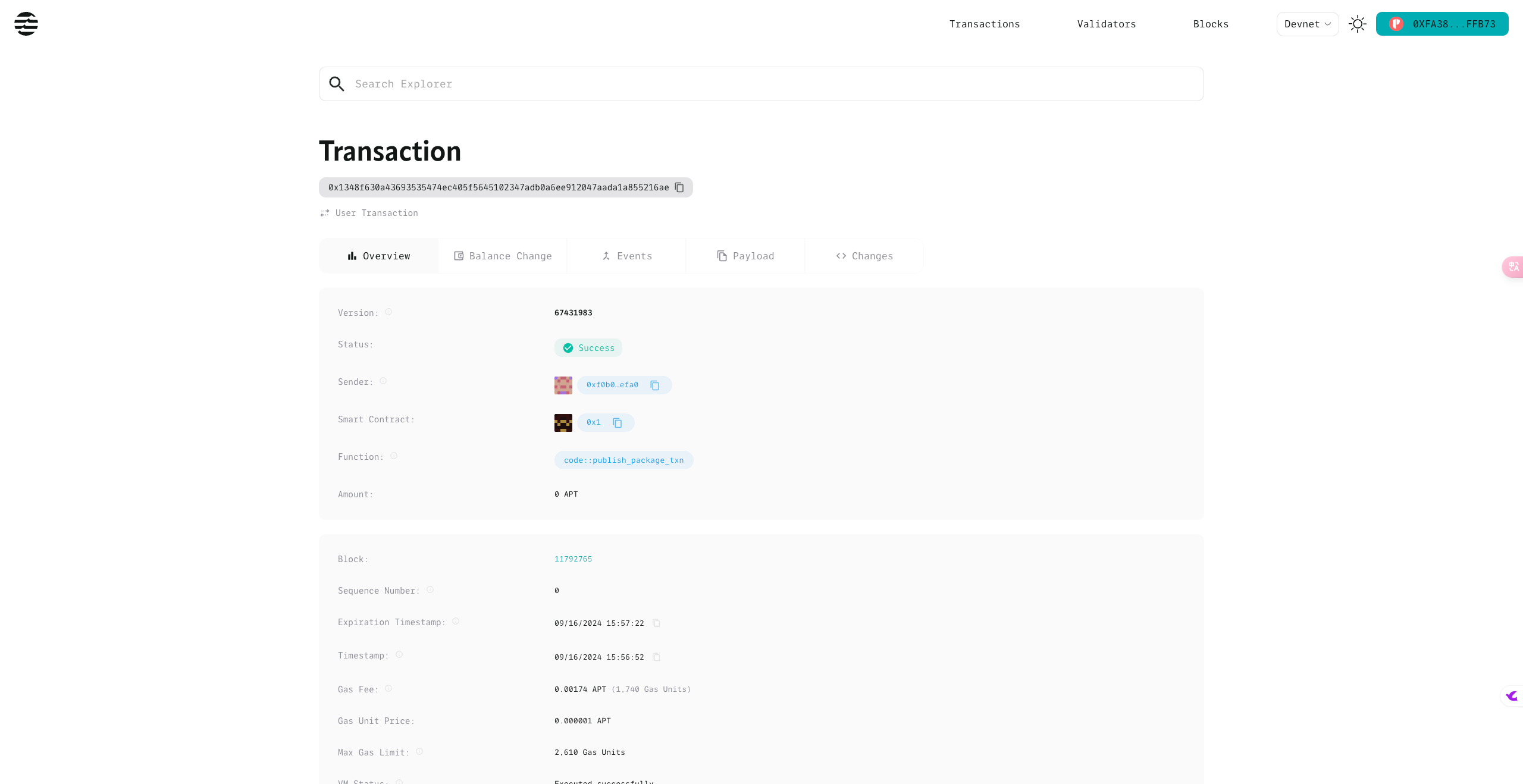
调用random_u8 方法生产随机数
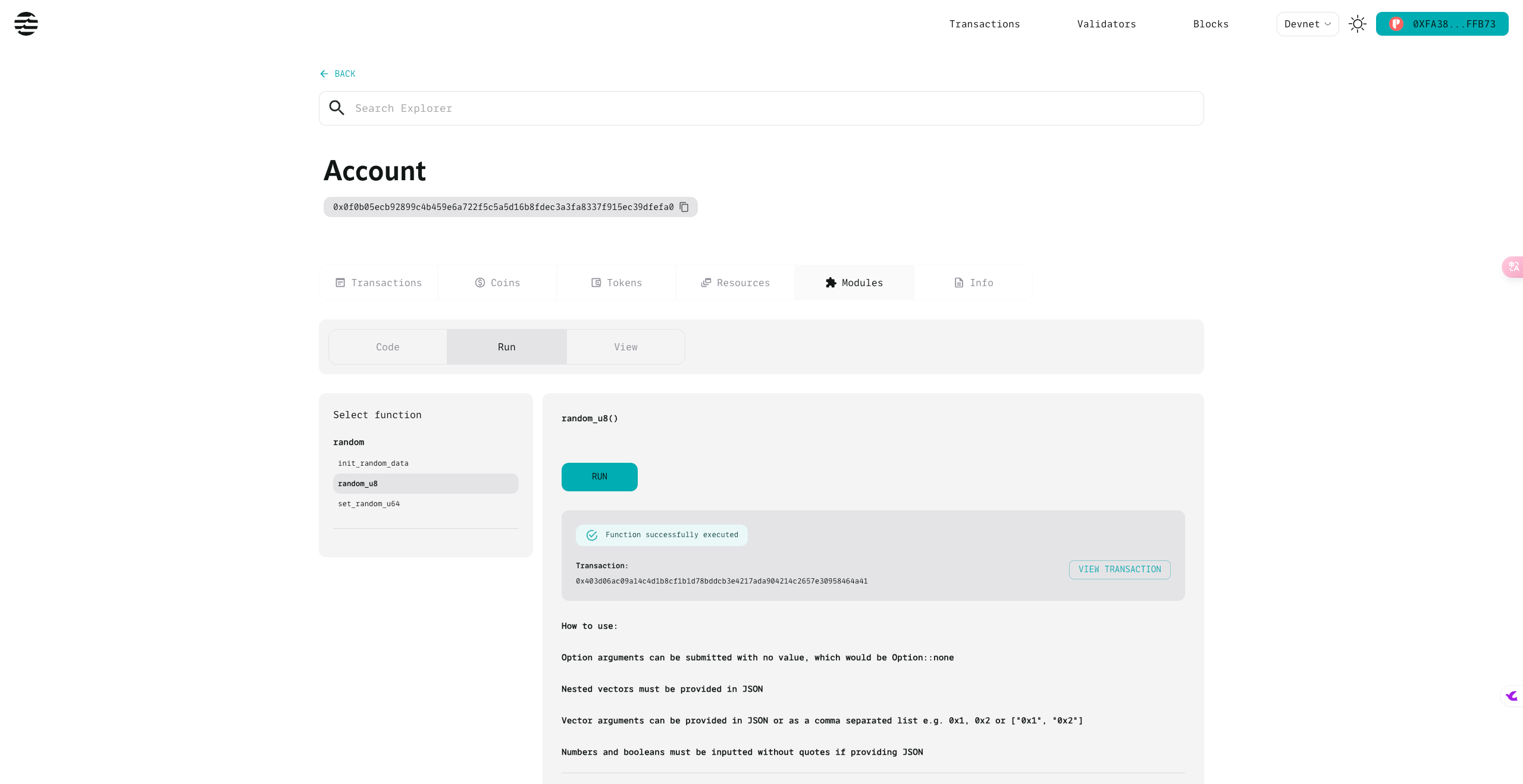
查看 random_u8 Transaction Events
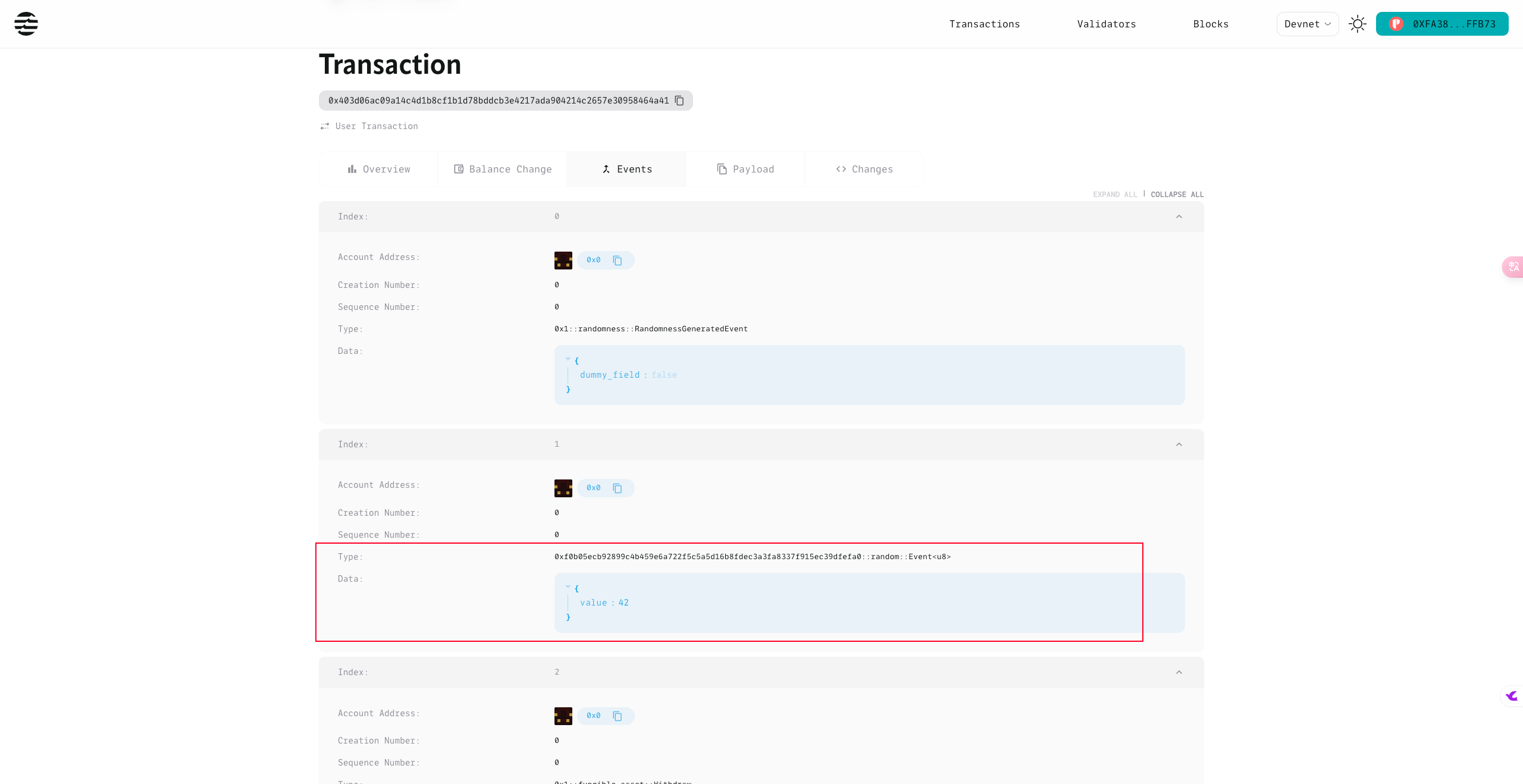
调用 set_random_u64 方法生成随机数并保存
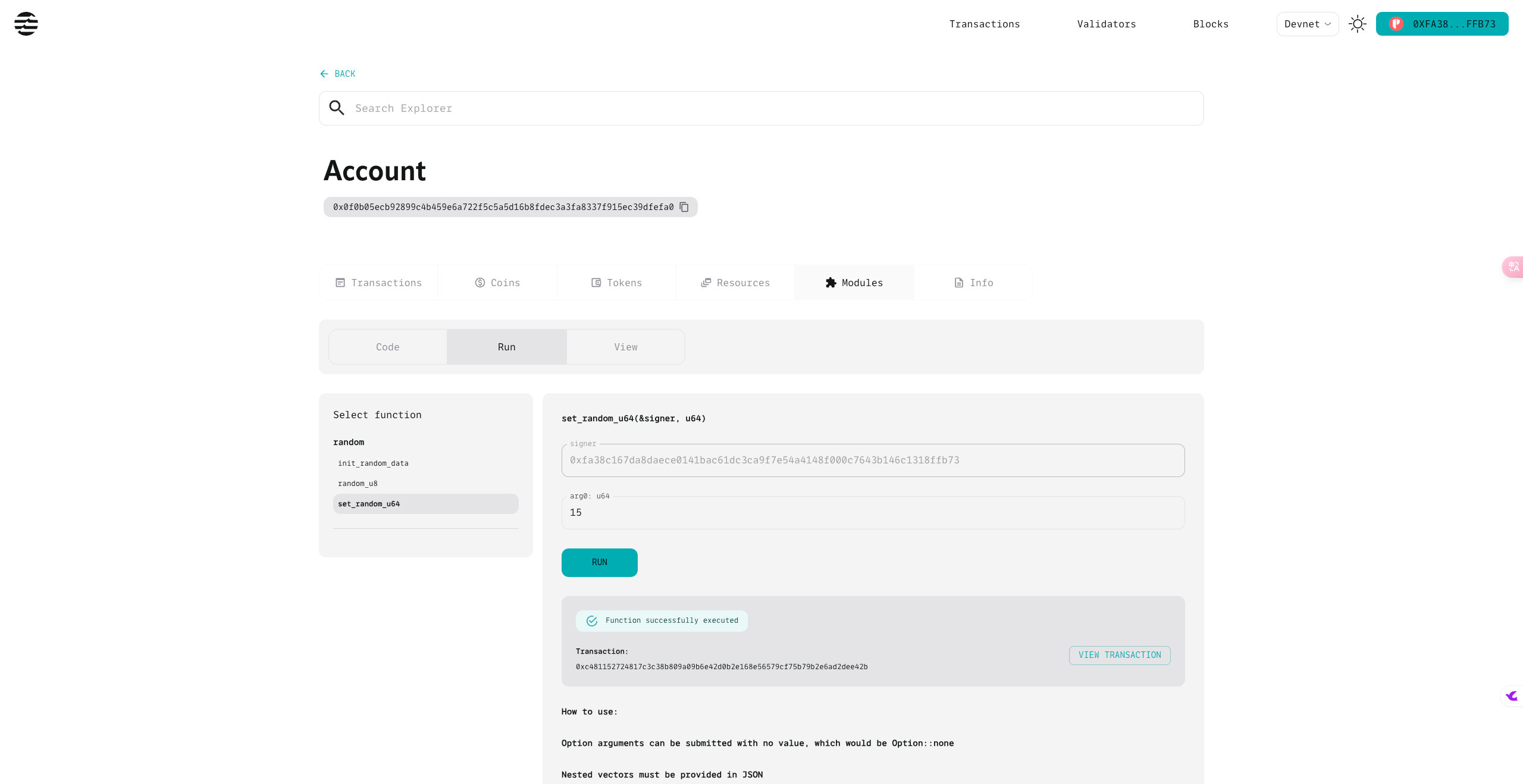
查看 Transaction Events 中的随机数
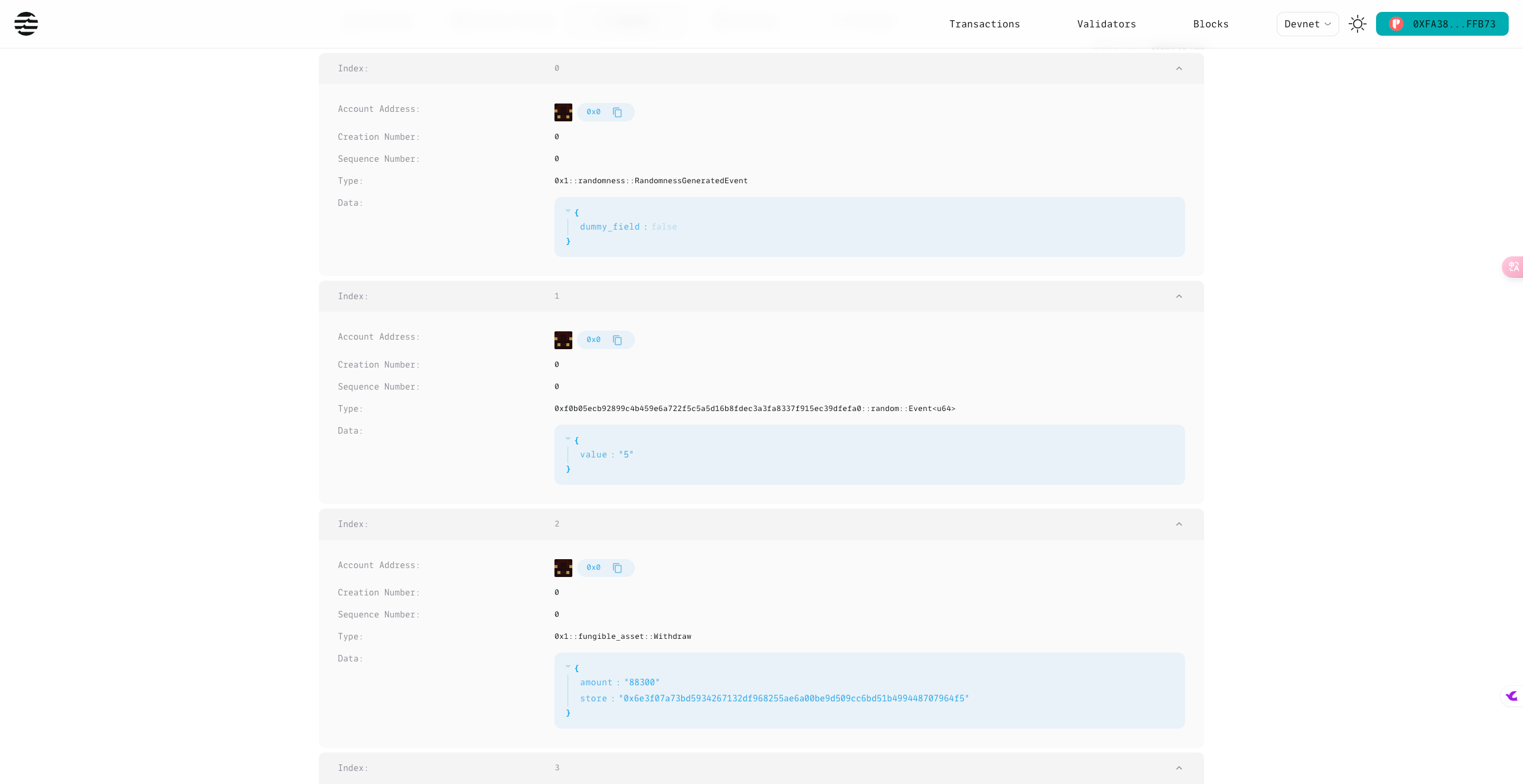
调用get_random_data 方法获取随机数
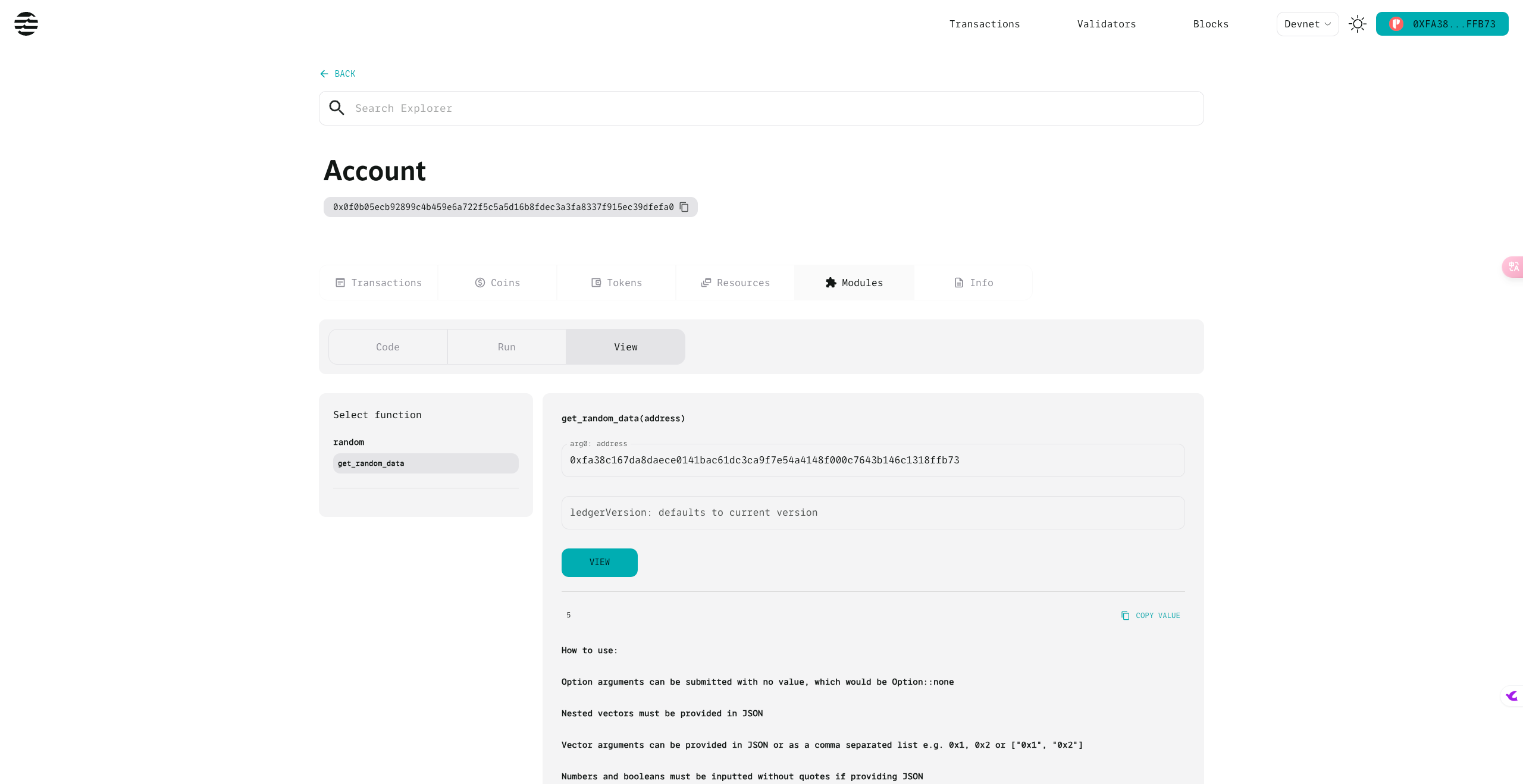
源码参考
/// Generates a number $n \in [min_incl, max_excl)$ uniformly at random.
///
/// NOTE: The uniformity is not perfect, but it can be proved that the bias is negligible.
/// If you need perfect uniformity, consider implement your own via rejection sampling.
public fun u64_range(min_incl: u64, max_excl: u64): u64 acquires PerBlockRandomness {
event::emit(RandomnessGeneratedEvent {});
u64_range_internal(min_incl, max_excl)
}
public fun u64_range_internal(min_incl: u64, max_excl: u64): u64 acquires PerBlockRandomness {
let range = ((max_excl - min_incl) as u256);
let sample = ((u256_integer_internal() % range) as u64);
min_incl + sample
}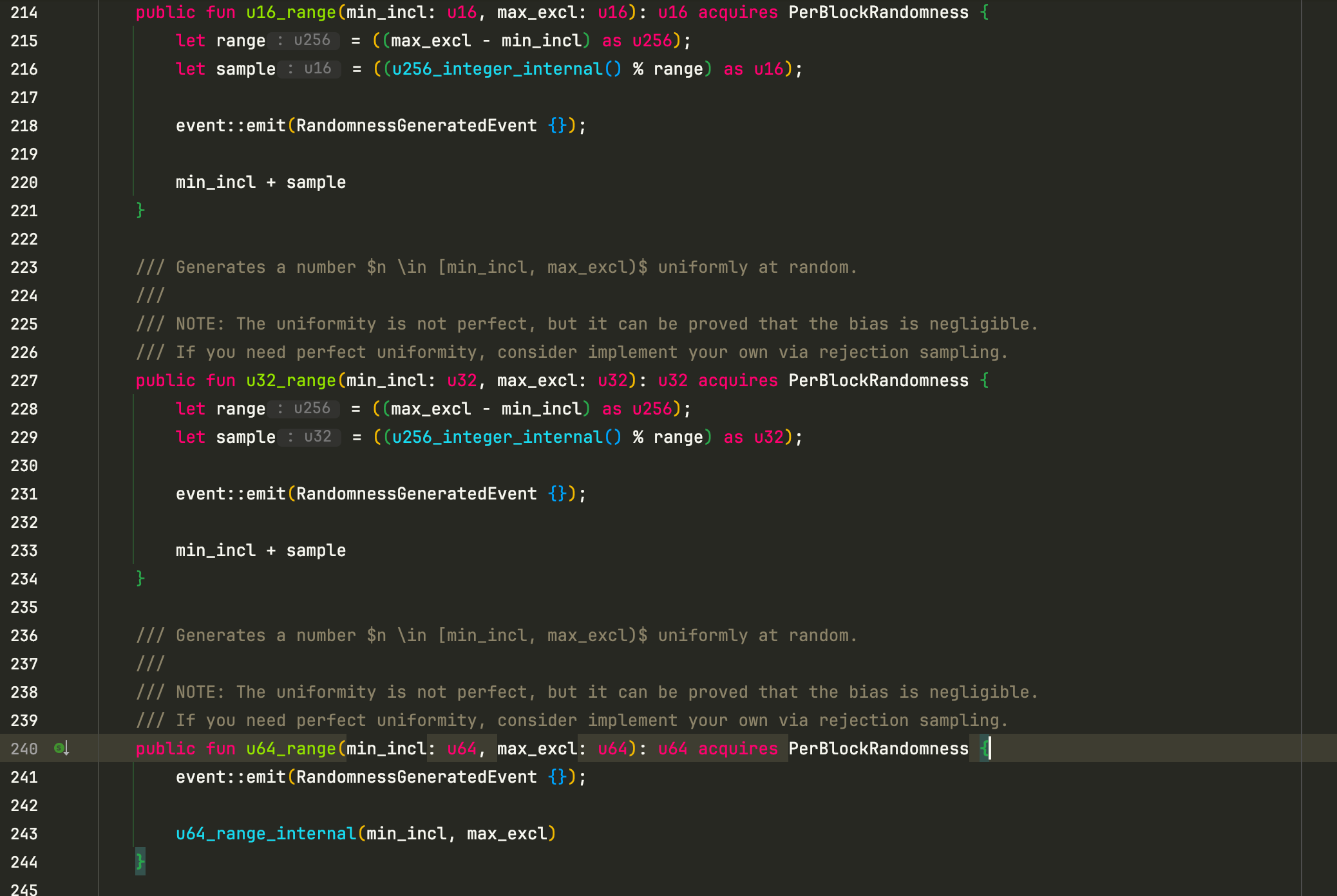
总结
本文通过实战操作详细讲解了如何使用 Aptos Move 的随机数生成 API,展示了从项目初始化、合约编写到部署、调用随机数生成函数的全过程。同时,我们还探索了如何在 Aptos 区块链浏览器中查看合约发布后的事件。通过使用 Aptos Move 提供的随机数生成功能,开发者可以更轻松地构建基于随机性的智能合约逻辑,确保应用的公平性和安全性。
参考
- https://aptos.dev/en/build/smart-contracts/randomness
- https://github.com/aptos-foundation/AIPs/blob/main/aips/aip-41.md
- https://explorer.aptoslabs.com/account/0x0f0b05ecb92899c4b459e6a722f5c5a5d16b8fdec3a3fa8337f915ec39dfefa0/modules/run/random/random_u8?network=devnet
- https://github.com/aptos-labs/aptogotchi-random-mint/tree/main
